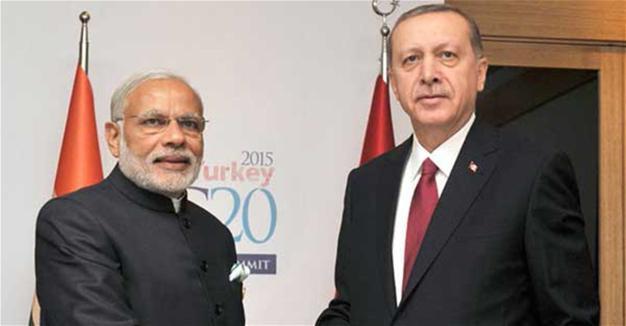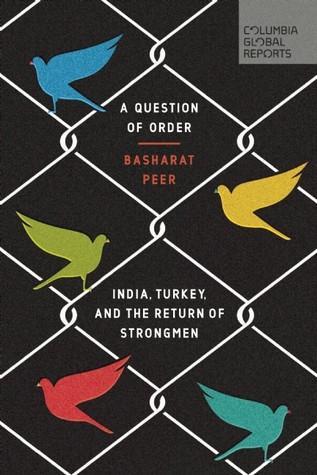Turkey, India and the return of strongmen
William Armstrong - william.armstrong@hdn.com.tr

Indian Prime Minister Narendra Modi and Turkish President Recep Tayyip Erdoğan meet on the sidelines of the G-20 Summit in Antalya in 2015.
‘A Question of Order: India, Turkey, and the Return of Strongmen’ by Basharat Peer (Columbia Global Reports, 160 pages, $13)
Plenty of ink has been spilled on the global rise of the new authoritarianism and “illiberal democracy.” The democratic tide that flowed out after the fall of the Berlin Wall has apparently been reversed, returning as angry populist waves crashing on the shores of the West. Belligerent strongmen are coming to power in a range of countries, supported by voters motivated by religious and ethnic nationalism, economic anxieties and disillusionment with earlier inefficient or corrupt elites.

Each country roiled by these forces can only be understood within its own history, but parallels can be traced across them all. Indian Prime Minister Narendra Modi and Turkish President Recep Tayyip Erdoğan are among the pioneers of the new populism, and “A Question of Order: India, Turkey, and the Return of Strongmen” by New York Times journalist Basharat Peer details striking similarities between the two. It also issues a timely warning about the threat to liberal assumptions of politics as a vehicle of the inevitable march to freedom.
Peer grew up in Indian Kashmir, the mountainous disputed territory on the border with Pakistan. Described as the “largest militarized zone in the world,” more than 47,000 people have been killed there since India and Pakistan gained independence in 1947. Peer draws a parallel between Kashmir and Turkey’s Kurdish southeast, describing how conflict in both has reinforced authoritarianism in Turkey and India. “A nation’s illiberal practices on its borders do not remain isolated there,” he writes. “Using militant nationalism to beat up on peripheral populations often paves way for the rise of authoritarian figures in the center … The periphery might be ignored but it has a way of intruding upon the center.”
There are of course significant differences. It would be wrong to suggest that Erdoğan and Modi are the causes of both problems. Indeed, before Erdoğan’s most recent swing to the nationalist right he was the Turkish leader who did more than many others to contribute to peace and development in the southeast. But the comparison can still be illuminating - particularly since the remilitarization of the conflict between the Turkish military and the outlawed Kurdistan Workers’ Party (PKK) after the collapse of the peace process in summer 2015.
Modi has been able to channel similar militant energies in India. His Hindu nationalist agenda has targeted India’s Muslim minority, framed as standing in the way of India’s onward march. This perspective condemns the secularism of modern India’s founding leader Jawaharlal Nehru as an artificial restriction on the Hindu majority’s “national will.” “Hindu nationalist politics,” writes Peer, “furiously tore apart the country’s civic life and irrevocably broke the consensus of Nehruvian secularism as the religion of India.” The pull of nationalism is also seductive in the search for unity, rising above messy divisions of caste, religion, region and ethnicity. The fact that Modi oversaw the massacre of hundreds of Muslims in communal violence as chief minister of Gujarat in 2002 is seen by many as recommendation, not disqualification, for his election as prime minister.
Today’s populist authoritarianism in India and Turkey was also helped along by the discredited old order. In Turkey, the economic meltdown and political gridlock of the 1990s exposed a venal political class and paved the way for the AKP’s sweeping new regime. In India, the old Congress party was seen as sclerotic and mired in corruption. Modi and Erdoğan skillfully manipulate these memories and emphasize their support for civic amenities allegedly neglected by the old order.
The two governments are also focused on a more distant history. Both nurture an impulse to rewrite the past and force history into a more flattering pattern. As Peer writes: “Strongmen are revisionists who share a love for rewriting school textbooks, retelling tales of ancient glories, and reviving old wounds. They are united by their promises to make their countries great again.” A young pro-Modi activist in Hyderabad tells Peer that he wants to correct “historical wrongs,” advocating “a transformation in the way we teach history, the way we inculcate a sense of pride in our past and history.” Similarly, the Turkish government pushes an airbrushed, fantasy version of Ottoman history – a sad desecration of the far more sophisticated and interesting reality.
“A Question of Order” is not flawless. Its account of modern Turkey’s history repeats the tenacious “Kemalist state vs. Islamic society” dichotomy.
The reality is more nuanced. The “Kemalist state” was never the monolith of the Islamist imagination, and religious conservatives have had space in the state almost uninterrupted since 1950. Indeed, it is deeply ironic that the current Ankara-sponsored nationalist conservatism was greatly aided by the September 1980 military coup.
But overall this is an impressive and sharply written book. Peer quotes Isaiah Berlin: “Freedom for the wolves has often meant death to the sheep.” Recent events in democracies of both East and West are stirring fears of destructive majoritarianism. Strongmen everywhere are rediscovering “the art of converting citizens’ fears and insecurities into electoral support.” This timely book sounds an ominous warning.
*Follow the Turkey Book Talk podcast via Twitter, iTunes, Stitcher, Podbean, Acast, or Facebook.

 Each country roiled by these forces can only be understood within its own history, but parallels can be traced across them all. Indian Prime Minister Narendra Modi and Turkish President Recep Tayyip Erdoğan are among the pioneers of the new populism, and “A Question of Order: India, Turkey, and the Return of Strongmen” by New York Times journalist Basharat Peer details striking similarities between the two. It also issues a timely warning about the threat to liberal assumptions of politics as a vehicle of the inevitable march to freedom.
Each country roiled by these forces can only be understood within its own history, but parallels can be traced across them all. Indian Prime Minister Narendra Modi and Turkish President Recep Tayyip Erdoğan are among the pioneers of the new populism, and “A Question of Order: India, Turkey, and the Return of Strongmen” by New York Times journalist Basharat Peer details striking similarities between the two. It also issues a timely warning about the threat to liberal assumptions of politics as a vehicle of the inevitable march to freedom.